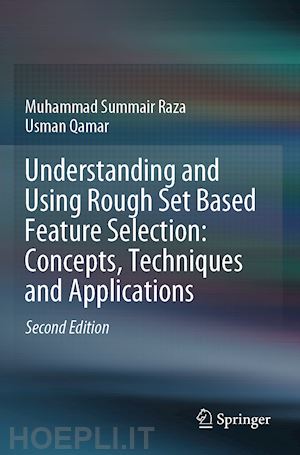
Questo prodotto usufruisce delle SPEDIZIONI GRATIS
selezionando l'opzione Corriere Veloce in fase di ordine.
Pagabile anche con Carta della cultura giovani e del merito, 18App Bonus Cultura e Carta del Docente
This book provides a comprehensive introduction to rough set-based feature selection. Rough set theory, first proposed by Zdzislaw Pawlak in 1982, continues to evolve. Concerned with the classification and analysis of imprecise or uncertain information and knowledge, it has become a prominent tool for data analysis, and enables the reader to systematically study all topics in rough set theory (RST) including preliminaries, advanced concepts, and feature selection using RST. The book is supplemented with an RST-based API library that can be used to implement several RST concepts and RST-based feature selection algorithms.
The book provides an essential reference guide for students, researchers, and developers working in the areas of feature selection, knowledge discovery, and reasoning with uncertainty, especially those who are working in RST and granular computing. The primary audience of this book is the research community using rough set theory (RST) to perform feature selection (FS) on large-scale datasets in various domains. However, any community interested in feature selection such as medical, banking, and finance can also benefit from the book.
This second edition also covers the dominance-based rough set approach and fuzzy rough sets. The dominance-based rough set approach (DRSA) is an extension of the conventional rough set approach and supports the preference order using the dominance principle. In turn, fuzzy rough sets are fuzzy generalizations of rough sets. An API library for the DRSA is also provided with the second edition of the book.
Chapter-1: Introduction to Feature Selection
This chapter will discuss feature selection, its background, advantages and practical applications.
Chapter-2: Background
This chapter will explain various Non-RST based Feature Selection approaches from literature along with strengths and weaknesses of each.
Chapter-3: Rough Set Theory
This chapter will provide introduction of Rough Set theory along with its background, particular features and differences from other set theories. As well as discuss basic concepts of rough Set theory. Examples will also be provided by using very small sample datasets.Chapter-4: Advance Concepts in Rough Set theory
This chapter will discuss some advance concepts like rough set based heuristics, rules, lemmas etc.Chapter-5: Rough Set Theory Based Feature Selection Techniques
Rough set theory has been successfully used for feature selection techniques. In this chapter, we will present various feature selection techniques which use RST concepts.
Chapter-6: Unsupervised Feature Selection Using RST
Unsupervised feature selection information that could find feature subsets without given any class labels. In this section, we will discuss some of the unsupervised feature subset algorithms based on rough set theory.
Chapter-7: Critical Analysis of Feature Selection Algorithms
Critical review of each approach discussed. Critical review will include strengths and weaknesses of each. Special emphasis will be given on complexity analysis of each approach.
Chapter -8: Dominance based Rough Set Approach
Dominance-based rough set approach (DRSA) is an extension to the conventional rough set approach which supports the preference order using dominance principle where an item having higher value of attributes should belong to higher decision classes.
Chapter -9: Fuzzy-Rough Sets
Fuzzy rough sets were introduced as a fuzzy generalization of rough sets. In this chapter, we discuss general approach to the fuzzification of rough sets.
Chapter-10: Introduction to Classic Rough Set Based APIs library
This chapter will provide details explanation of the RST based API library (that will provided with the book) along with working example of each of the API function. This chapter will work as instruction manual for the library.
Chapter-11: Dominance Based Rough Set API library
This chapter will provide details explanation of the dominance based RST API along with working example of each of the API function.
Dr. Muhammad Summair Raza holds a Ph.D. specialization in Software Engineering from the National University of Science and Technology (NUST), Pakistan. He completed his M.S. at the International Islamic University, Pakistan, in 2009. He is also associated with the Virtual University of Pakistan as an Assistant Professor. Having published various papers in international-level journals and conference proceedings, his research interests include Feature Selection, Rough Set Theory and Trend Analysis.
Dr. Usman Qamar has over 15 years of experience in data engineering in both academia and industry. He holds a Master’s in Computer Systems Design from the University of Manchester Institute of Science and Technology (UMIST), UK, as well as an M.Phil. and Ph.D. in Computer Science from the University of Manchester, UK. Dr Qamar’s research expertise is in Data and Text Mining, Expert Systems, Knowledge Discovery, and Feature Selection, areas in which he has published extensively. He is currently a Tenured Associate Professor at the Department of Computer & Software Engineering, National University of Sciences and Technology (NUST), Pakistan, where he also heads the Knowledge and Data Engineering Research Centre (KDRC).











Il sito utilizza cookie ed altri strumenti di tracciamento che raccolgono informazioni dal dispositivo dell’utente. Oltre ai cookie tecnici ed analitici aggregati, strettamente necessari per il funzionamento di questo sito web, previo consenso dell’utente possono essere installati cookie di profilazione e marketing e cookie dei social media. Cliccando su “Accetto tutti i cookie” saranno attivate tutte le categorie di cookie. Per accettare solo deterninate categorie di cookie, cliccare invece su “Impostazioni cookie”. Chiudendo il banner o continuando a navigare saranno installati solo cookie tecnici. Per maggiori dettagli, consultare la Cookie Policy.